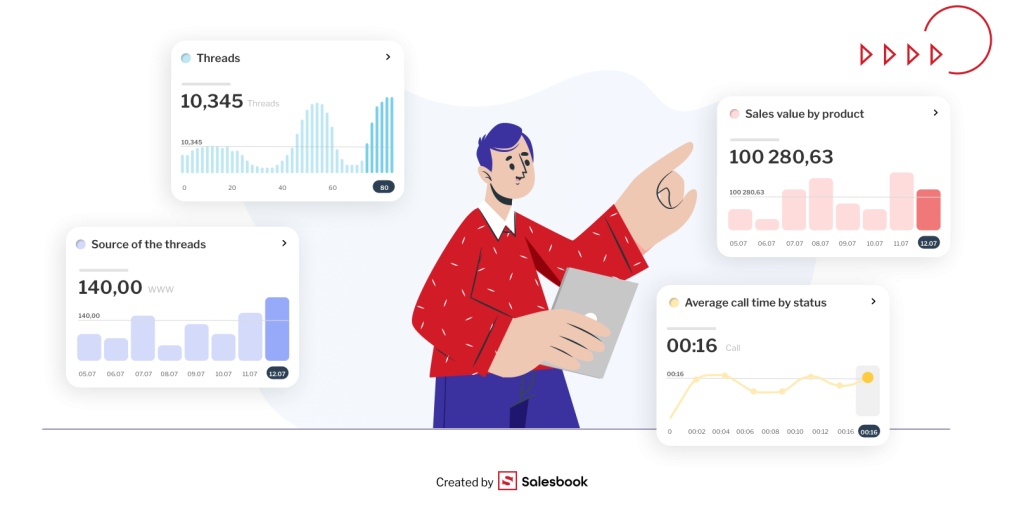Sales Analysis Unveiled: Mastering Sales Reports for Business Growth

Sales analysis stand as a crucial element for growth and competitiveness. Harvard Business Review notes that analytics-driven companies often outperform their peers. Sales reports, far more than just data compilations, narrate a business’s journey, guiding strategies and customer engagement towards profitable avenues. The Aberdeen Group highlights that companies using sales analysis see significant improvements in customer retention rates.
The challenge, however, lies in making this complex process accessible. This is where tools like Salesbook come into play, offering real-time insights and simplifying data analysis for sales professionals. As we explore the nuances of sales analysis, we will demonstrate how integrating technology, like Salesbook, can transform data into a strategic asset for business growth.
Laying the Foundation: Understanding the Importance of Sales Analysis
In the quest for market dominance, understanding and implementing effective sales analysis is more than a strategic advantage—it’s a necessity.
As businesses navigate through competitive landscapes, sales analysis emerge as essential in deciphering market trends, customer behaviors, and operational efficiencies.

The Role of Data in Modern Sales Strategies
Modern sales strategies are increasingly data-driven, with sales data acting as the fuel for informed decision-making. In this era, where every customer interaction can be quantified and analyzed, the role of data is paramount.
Sales teams are no longer just selling; they are operating on insights gleaned from meticulous sales data analysis. This approach not only sharpens the sales process but also aligns it more closely with evolving market demands and customer preferences.
Sales data analysis transcends traditional methods, offering a panoramic view of the sales pipeline and customer journey. With tools like predictive sales analysis, sales teams can forecast future trends, anticipate customer needs, and adjust their strategies accordingly.
This forward-thinking approach is instrumental in staying ahead in a competitive market, ensuring that sales strategies are not just reactive but proactively tailored to meet emerging challenges and opportunities.
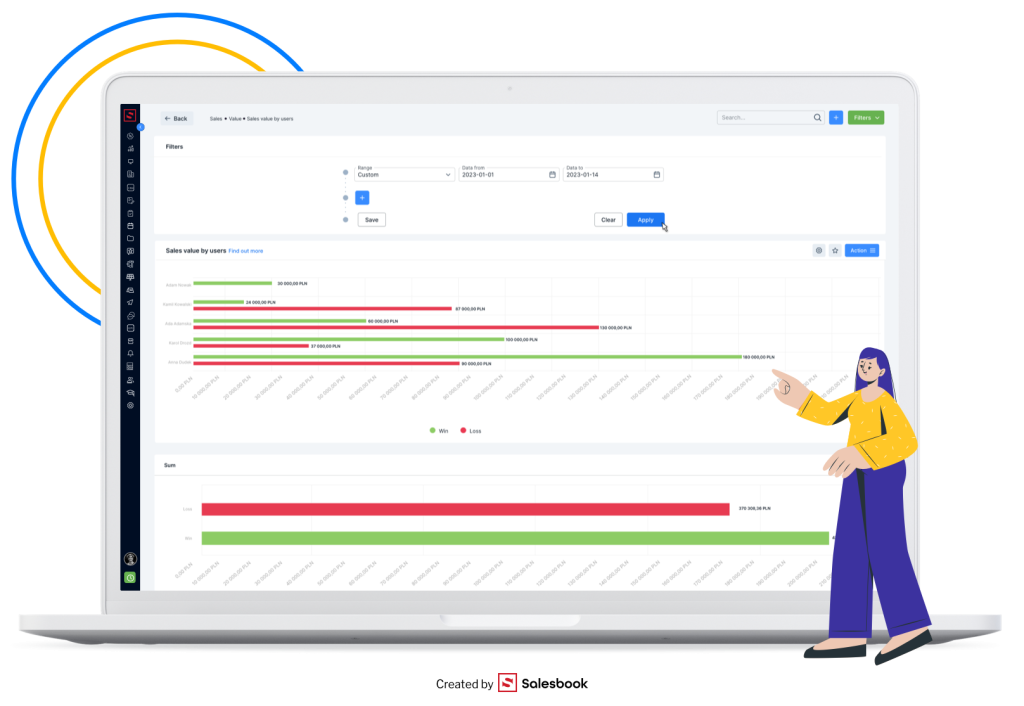
Key Metrics to Track in Sales Analysis
Identifying and tracking the right sales metrics is crucial for effective sales performance analysis. These metrics serve as indicators of sales health, helping businesses focus on areas that need attention. Essential metrics include sales revenue, conversion rates, average deal size, sales cycle length, and customer acquisition costs.
Beyond these basics, sales trend analysis dives deeper, examining patterns and fluctuations in sales data over time. This analysis aids in understanding the effectiveness of sales strategies and adjusting sales targets as necessary. Sales pipeline analysis is another vital component, offering insights into the efficiency of the sales process, from lead generation to closing deals.
Sales analysis tools, like Salesbook, streamline these processes, allowing sales teams to efficiently analyze sales data and generate comprehensive sales analysis reports. These tools empower sales teams to not only meet but exceed their sales targets by providing actionable insights into every stage of the sales cycle.
The backbone of a robust sales strategy lies in the adept use of sales analysis. From shaping sales processes to refining sales forecasts, the comprehensive analysis of sales data is indispensable for driving sales growth and achieving business objectives.

The Art of Sales Reporting: What You Need to Know
Sales reporting, in the modern data-driven era, is an art form that requires precision and strategic thinking. With businesses generating an average of 2.5 quintillion bytes of data each day, as reported by DOMO, mastering the art of sales reporting is crucial for any organization looking to refine its sales strategy and drive growth.
Designing Effective Sales Reports: Best Practices
The foundation of effective sales reporting lies in understanding the purpose and audience of each report. Reports should be tailored to provide actionable insights, not just raw data. This requires a focus on key sales metrics that align with business objectives.
Effective sales reports often include metrics like sales revenue, conversion rates, and the length of the sales cycle, which provide a comprehensive view of sales performance.
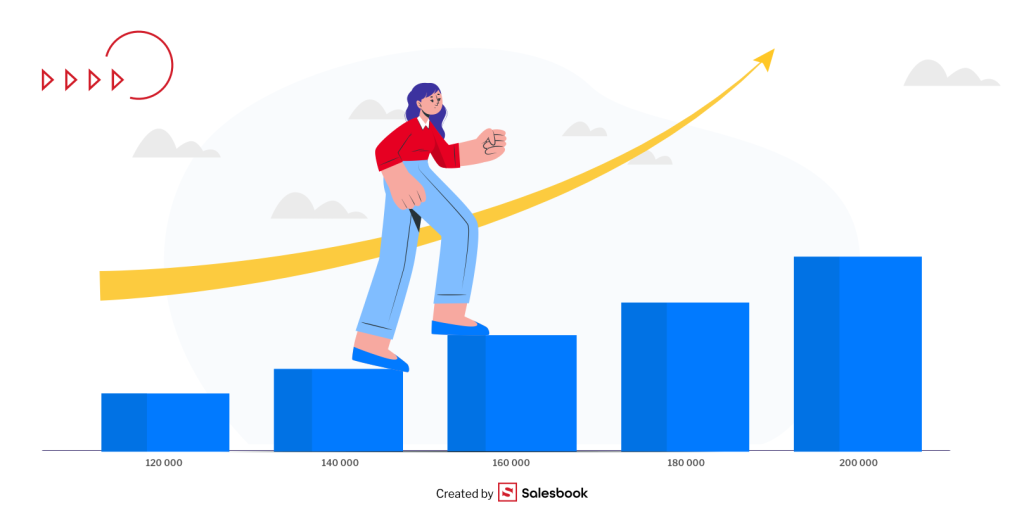
Incorporating sales trend analysis into reports can offer deeper insights into the effectiveness of sales processes and strategies. Predictive sales analysis, a forward-looking approach, helps in forecasting future trends and sales targets, enabling businesses to stay ahead of the curve.
Utilizing a sales analysis tool like Salesbook can greatly streamline the process of creating and analyzing sales reports. These tools can automate data collection and analysis, freeing up sales teams to focus on strategy and execution.
Salesbook, for instance, allows for real-time sales data analysis, ensuring that sales teams are working with the most current and relevant data.
Common Pitfalls in Sales Reporting and How to Avoid Them
Despite the best intentions, sales reporting can sometimes lead to misleading conclusions if not done correctly. One common pitfall is the over-reliance on vanity metrics that look impressive on paper but don’t contribute to strategic decision-making. To avoid this, focus on metrics that directly impact sales growth and reflect the health of the sales pipeline.
Another challenge is the underutilization of sales data. Sales teams often collect vast amounts of data but fail to analyze it effectively. Pipeline analysis, for example, can provide critical insights into the efficiency of the sales process, yet it is often overlooked. Sales teams should leverage sales analysis reports to gain a comprehensive understanding of the entire sales cycle, from lead generation to closing deals.

Lastly, failing to regularly update and revise sales forecasts can lead to misaligned sales strategies. Sales forecasts should be dynamic, adapting to market changes and new data. Regularly analyzing sales data ensures that sales strategies remain relevant and effective.
The art of sales reporting lies in the ability to transform data into insights. By focusing on relevant sales metrics, leveraging advanced tools like Salesbook for sales data analysis, and avoiding common pitfalls, organizations can ensure that their sales reports are not just informative but instrumental in driving sales success.
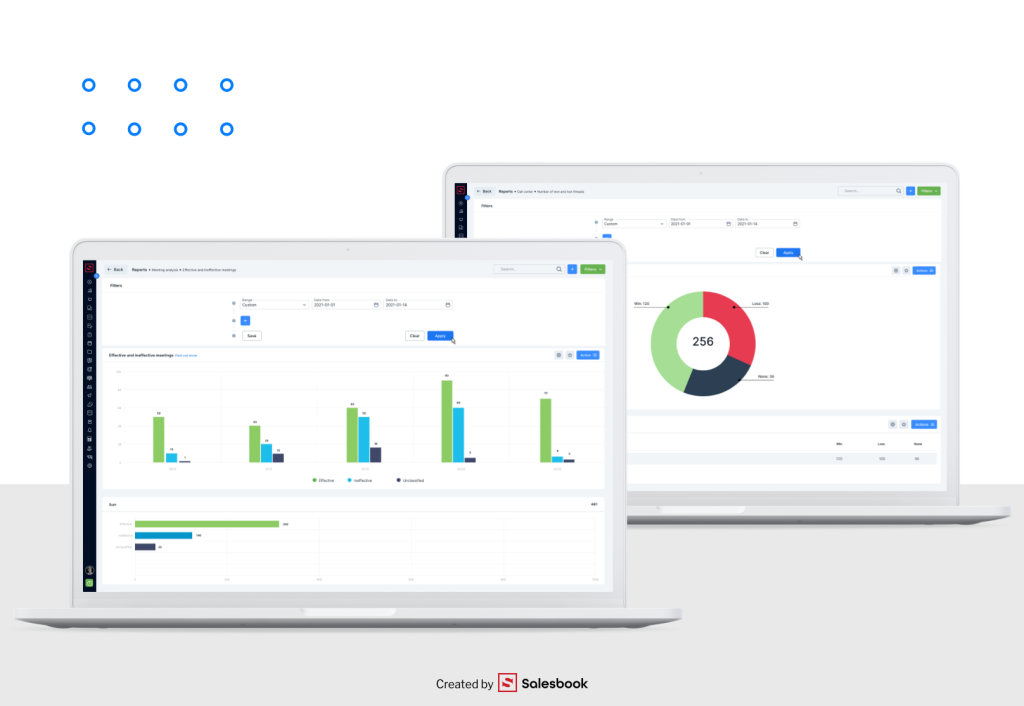
Advanced Techniques in Sales Analysis
In the realm of sales analytics, advancing beyond basic analysis to more sophisticated techniques can significantly enhance the strategic capabilities of sales and marketing teams. Advanced analytics not only refine current strategies but also pave the way for predicting future trends and adapting to market dynamics.
Leveraging Predictive Analytics for Sales Forecasting
Predictive analytics has become a cornerstone for sales forecasting, empowering sales teams to anticipate future sales with greater accuracy. By analyzing historical sales data and identifying patterns, predictive analytics can forecast future sales, enabling sales managers to make more informed decisions about sales targets and strategies.
According to a study by Aberdeen Group, companies that use predictive analytics for sales forecasting have a 28% higher win rate of their forecasted opportunities compared to non-users. This statistical edge underscores the value of predictive analysis in enhancing the sales team’s performance and optimizing sales strategies.
Predictive analytics also aids in product sales analysis, allowing companies to understand which products are likely to perform well in different market segments. This level of insight is invaluable for tailoring marketing campaigns and optimizing inventory levels, ensuring that resources are allocated efficiently.

Integrating Market Trends and Competitive Analysis in Reports
Effective sales analysis extends beyond internal data analysis to include an understanding of broader market trends and competitive dynamics. Integrating market research into sales analysis reports provides a more holistic view of the industry landscape, enabling sales and marketing teams to adapt their strategies in line with current trends.
Sales trends, emerging from market research, offer a glimpse into how consumer preferences and behaviors are evolving. By aligning sales strategies with these trends, companies can stay ahead of the curve and maintain relevance with their target audiences.

Competitive analysis is another critical component, providing insights into how competitors are performing and the strategies they are employing. This knowledge allows sales teams to identify opportunities for differentiation and to refine their sales approaches accordingly.
Advanced sales analysis, encompassing predictive analytics and the integration of market and competitive insights, empowers sales teams to be more strategic and proactive. This approach not only improves sales performance but also ensures that sales strategies are aligned with the ever-changing market dynamics and customer preferences.
Technology and Sales Analysis: A Synergy for Success
The intersection of technology and sales analysis is transforming the landscape of business decision-making. In this era, where data is a critical asset, the synergy between technology and analytics is pivotal for driving success and forecasting future revenue.

The Impact of Real-Time Data in Sales Decision-Making
Real-time data has revolutionized sales decision-making. It enables sales reps to respond swiftly to market changes and customer needs, enhancing both customer acquisition efforts and the retention of paying customers.
Real-time analysis reports provide actionable insights that are crucial for adjusting sales activities and strategies promptly. This immediacy helps in accurately predicting revenue generated and managing customer relationships effectively, extending customer lifetime value.
Harnessing New Technologies for Enhanced Reporting
Innovative technologies such as AI, machine learning, and advanced CRM platforms are redefining sales reporting. Advanced tools not only automate data collection but also provide deeper insights into sales performance. These technologies facilitate comprehensive analysis reports, which are essential for key stakeholders to make informed decisions.
The use of these technologies ensures that sales teams are equipped with the most relevant and actionable insights, leading to more effective strategies and ultimately, a significant impact on the bottom line. By harnessing new technologies, businesses are better positioned to understand and meet customer needs, optimize sales processes, and drive sustainable growth.
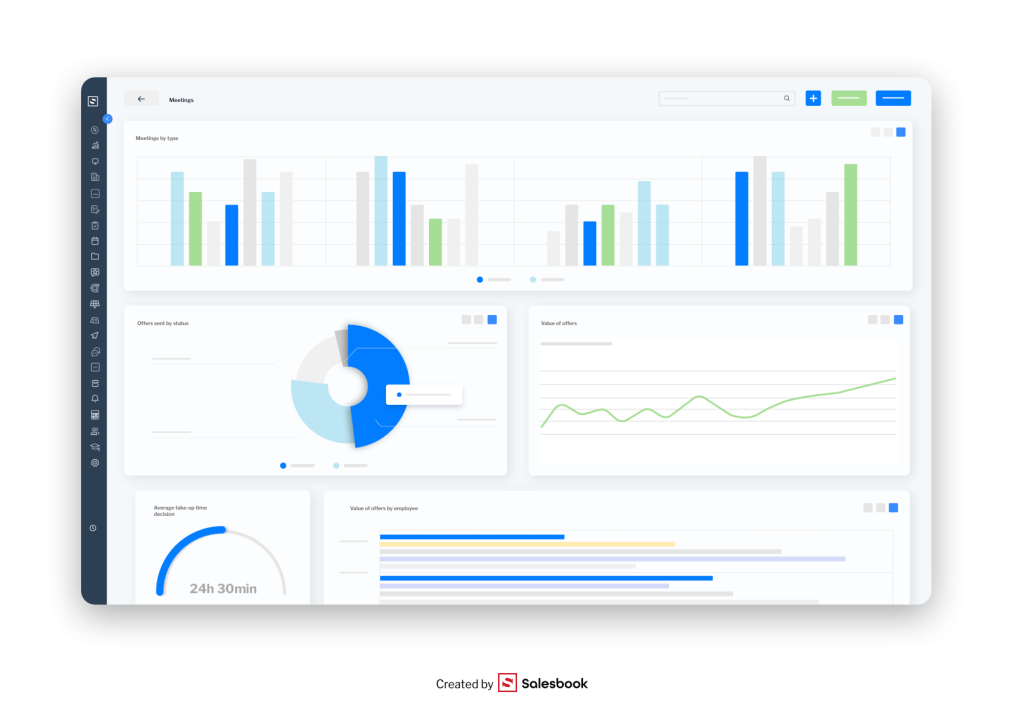
Salesbook: Your Partner in Sales Analysis
Salesbook emerges as a pivotal partner in the realm of sales analytics, offering cutting-edge solutions that transform data into strategic insights.
How Salesbook Simplifies Sales Reporting for Real-Time Insights
Salesbook’s AI-powered analytics module simplifies the complexity of sales reporting by providing real-time insights. This enables sales managers to monitor important sales metrics like units sold, net sales, and sales volume instantly, facilitating quick and informed decision-making.
Its capability to analyze past sales data in real-time helps in accurately setting and adjusting sales targets, ensuring alignment with current market trends.
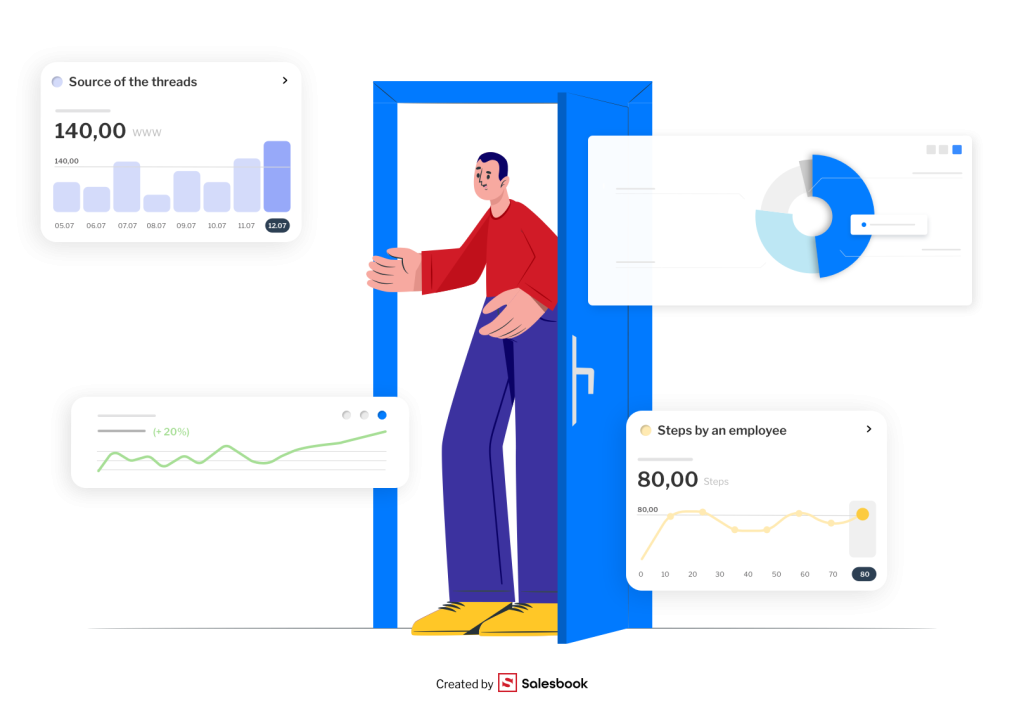
Salesbook’s Unique Features for Sales Analysis
Salesbook stands out with its ability to create personalized reports, catering to the specific needs of a sales organization. This customization extends beyond standard metrics, allowing for a deeper analysis of variables like sell-through rate and sales success.
Above all, Salesbook does not limit its analysis to quantitative data, but focuses just as much on analysing qualitative data. Only this combination of the two types of data allows conclusions and recommendations to be constructed that are relevant and accurate enough to base business decisions on.
Additionally, its AI module not only analyzes existing data but also predicts future trends, providing valuable insights that can guide sales strategies and optimize performance. Salesbook thus becomes an indispensable tool for any sales team aiming to maximize efficiency and drive growth.

Real-World Applications: Salesbook in Action
Salesbook’s real-world impact is best illustrated through its application across various industries, where its advanced features have significantly enhanced sales analysis and performance.
Case Studies: Boosting Sales Performance with Salesbook
In a case study involving a retail chain (KFA), Salesbook’s AI-powered analytics module was used to analyze sales metrics like sales trends and representative performance. The company’s management board believes that better analytical data translates into better team management. Thanks to Salesbook it was possible to organize the work of the traders themselves, which is now a process.
Another case saw a Polaris company has recorded significant savings in salespeople’s time – of as much as 85%. This opened up a path for improvement in sales team performance through better understanding of sales reps’ effectiveness and customer engagement patterns.
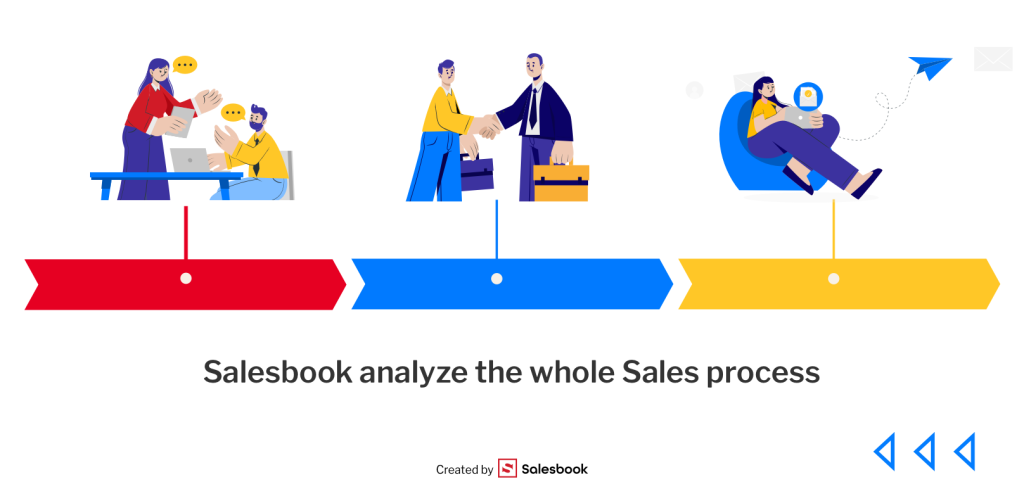
Customizing Salesbook for Your Business Needs
Customization is a key strength of Salesbook. For instance, a manufacturing firm tailored Salesbook’s sales analysis tools to their specific sales process, enabling them to better analyze sales, understand revenue patterns, and refine their sales analysis methods.
This bespoke approach allowed them to surpass their sales goals by aligning their strategies with real-time market data and trends.
Looking Ahead: The Future of Sales Analysis with Salesbook
As Salesbook continues to evolve, its impact on the future of sales analysis is poised to be substantial and transformative.
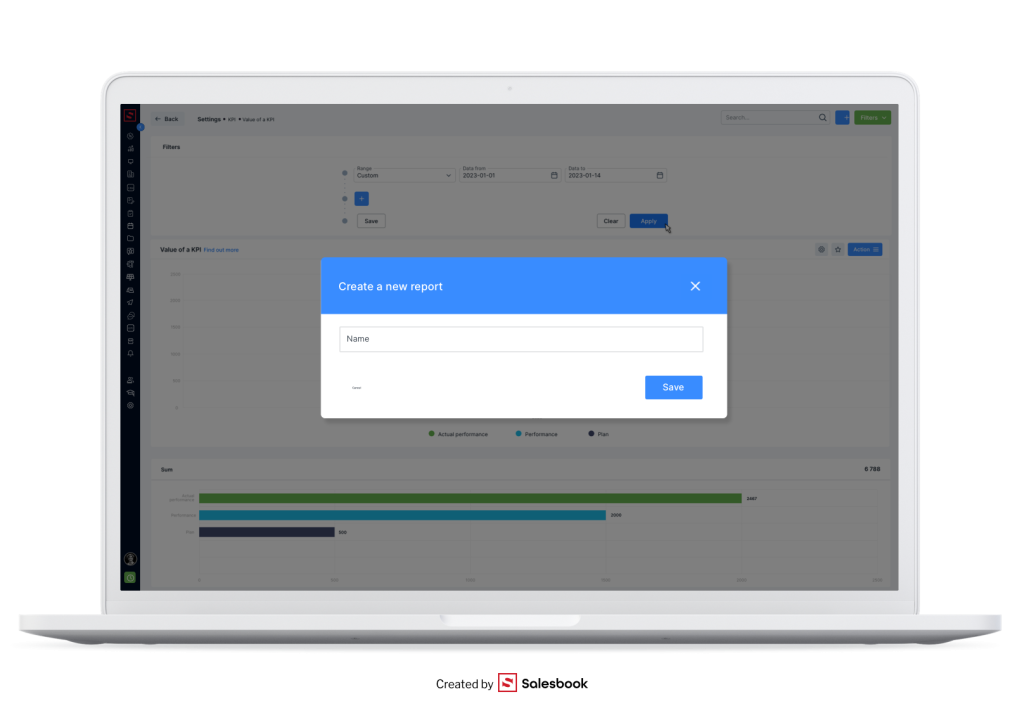
Upcoming Innovations in Salesbook for Sales Reporting
Anticipated innovations in Salesbook focus on enhancing its AI-powered analytics module to provide even more nuanced insights into the sales process. This includes advanced predictive analytics capabilities, enabling sales teams to anticipate market trends and customer behaviors with greater accuracy, thus refining their sales strategies.
How Salesbook Adapts to the Evolving Sales Landscape
Salesbook’s adaptability to the changing sales landscape is a key focus. The tool is being designed to integrate seamlessly with emerging sales analysis methods and technologies, ensuring that sales teams remain at the forefront of efficiency and effectiveness.
By continuously updating its features and capabilities, Salesbook aims to stay aligned with the latest sales processes and market demands, offering real-time, actionable insights that drive sales success.

Transforming Sales Analysis with Salesbook
Salesbook is redefining the landscape of sales analysis, offering innovative solutions that streamline and enhance the sales process. By integrating advanced sales analysis tools, Salesbook provides sales teams with real-time, actionable insights, fundamentally changing how sales data is interpreted and utilized.
This transformative approach aids sales teams in understanding complex market dynamics, optimizing sales strategies, and achieving their sales targets more effectively.
The evolution of Salesbook highlights its role as an indispensable asset in modern sales environments. By continuously adapting and improving its features, Salesbook ensures that sales teams are always equipped with cutting-edge tools for efficient and effective sales analysis, catering to the ever-changing demands of the sales process and market trends.
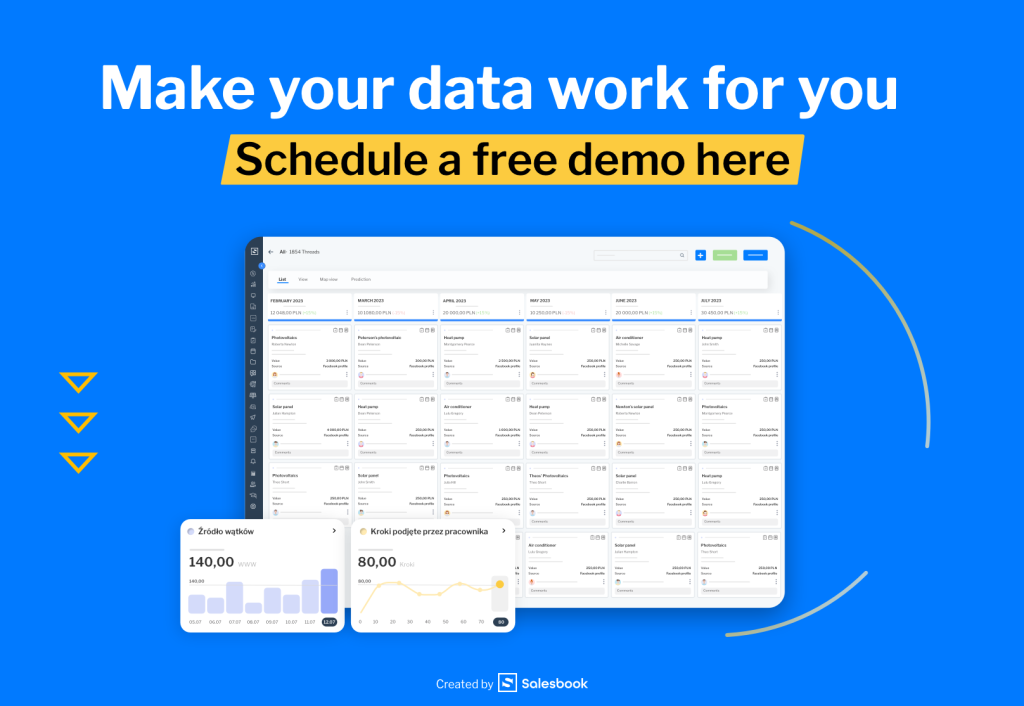
Recap: Key Takeaways on Sales Reporting and Analytics
Key takeaways include the importance of real-time data, the impact of AI-driven analytics, and the need for adaptable sales analysis tools in today’s fast-paced sales environment. Salesbook exemplifies these principles, providing sales teams with the tools they need for comprehensive sales analysis.
Salesbook’s Commitment to Empowering Sales Team performance
Salesbook’s commitment lies in its continual enhancement of features that streamline the sales process, offering intuitive and effective solutions for sales teams. Its dedication to advancing sales analytics ensures that teams are equipped with the best tools to analyze, strategize, and succeed in their sales goals.
Grow Your Business with Salesbook
Elevate your sales process and drive your business growth with Salesbook. Discover how our comprehensive sales analysis tools can transform your sales strategy and boost your team’s performance. Don’t miss this opportunity to see Salesbook in action and understand its full potential.
Ready to take the first step towards optimizing your sales process? Schedule a free demo of Salesbook today and engage with our experts to explore how our solution can be tailored to your business needs.
Table of Contents





